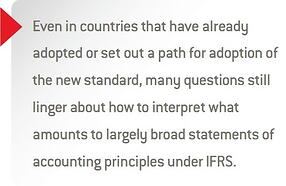 As the world transitions to a single, unified global accounting standard with the implementation of international financial reporting standards (IFRS), oil and natural gas exploration and production (E&P) companies in particular face daunting challenges with the transition. Even in countries that have already adopted or set out a path for adoption of the new standard, many questions still linger about how to interpret what amounts to largely broad statements of accounting principles under IFRS.
As the world transitions to a single, unified global accounting standard with the implementation of international financial reporting standards (IFRS), oil and natural gas exploration and production (E&P) companies in particular face daunting challenges with the transition. Even in countries that have already adopted or set out a path for adoption of the new standard, many questions still linger about how to interpret what amounts to largely broad statements of accounting principles under IFRS.
The global upstream oil and natural gas industry is hardly a stranger to upheaval. In fact, it’s safe to say that upheaval has been the norm throughout the history of the oil and gas exploration and production business. Whether it entails commodity price swings, geopolitical crises, disasters natural and man-made, or environmental and social issues, dramatic change has always punctuated the history of this most vital of industries. This pattern of frequent upheaval has been accentuated in just the past three years by a wild rollercoaster of developments:
- The spike, then collapse, of oil and natural gas prices—followed by another spike in oil prices while gas prices remain depressed
- The game-changing energy supply impact of commercializing development of gas and oil shales in North America—a trend starting to migrate to the rest of the world
- The disastrous Gulf of Mexico oil spill—and how it’s affecting the promise of deep-water oil and gas
- The rancorous debates over balancing energy, environmental, and economic needs—encompassing issues as thorny as peak oil supply and climate change amid a distressed global economy
- The unprecedented political upheaval sweeping the Middle East and North Africa—and with it alarming questions over current and future energy supplies

Certainly the question of a transition to new accounting standards for financial reporting may seem mundane in comparison with these headline-grabbing topics. However, the prospect of a new global financial reporting standard presents the upstream oil and gas industry with comparably daunting challenges and far-reaching change. Of special concern are the small and medium-sized companies; experience to date suggests that these firms have tended to lag expectations in making timely progress in the transition to IFRS. Senior executives at E&P firms worldwide will need the most flexible and yet comprehensive financial management software tools to be able to manage this “sea change.”
 English
English  Vietnamese
Vietnamese 

